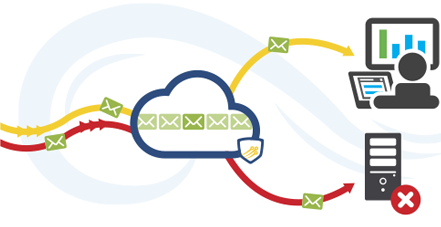OK, I’ll bite. This topic came up recently after an outage of Azure and Office 365. Because of this outage countless companies weren’t able to send and receive email for a couple of hours. Companies like Barracuda, Intermedia and many others are jumping on this to sell ‘email continuity’ solutions. They promise the availability of email even when the email provider goes down. So there must be value in these solutions…. or not?
Let’s take email: the advantages of email over physical mail are notable; it costs much less, is more reliable and delivery is much faster. Just those three are responsible for the decline of philately as a hobby.
However, email is also a very misused medium. Especially because people have gotten used to its shorter delivery time and good reliability, it’s now even being used for time-critical business processes. Two things that email’s not; 1) completely reliable and 2) real-time.
Email can get stuck. For example, if a spam filter along the way goes overzealous and marks your email as being spam, it’ll likely not arrive – or in the event it does, it might arrive in a folder that doesn’t get checked.
Email can arrive late. For some reason (e.g. because of a full mailbox) mail can just hang in the outbox and doesn’t get sent. And if you don’t have an internet connection you won’t be able to send or receive anything.
One of my customers was interested in ‘email continuity’ because they take orders in via email, which are then automatically processed and hence they consider this process as business critical. I won’t deny that sales is the lifeblood of companies, and I won’t say either that mail is a bad medium for taking orders. What I am saying that using email for time-critical processes is wrong. So the real question is; is taking in orders time-critical? As always, this depends 🙂
Let’s take Amazon.com. Being able to ship products incredibly fast is a competitive advantage compared to other online and offline resellers. The order process for Amazon is thus considered time-critical.
Just fantasize for a moment that Amazon would be taking in orders via email. Millions of emails each day flowing into a shared mailbox. In such a case an ‘email continuity’ solution would make sense because outage would mean lost sales to a competitor.
However, it’s quite obvious they wouldn’t be able to guarantee their next (or same) day deliveries because of the aforementioned email issues, let alone the management of that mailbox. You could automate the mailbox, but automating unstructured mail is immensely challenging and in a lot of cases undoable with current technology. It just wouldn’t work.
Now take a consultancy company which receives RFP’s or offer requests for large projects, where the expected time for a response is 30 days or more. In such a case it doesn’t actually matter if such a mail is opened the same or next day. Here it can make sense to use email, and the outage of an email provider would just be a minor issue. Still, using email, there’s the matter of email not guaranteeing delivery, so you must accept this (albeit low) risk.
So in both cases email continuity isn’t necessary. In the first because the process is time critical and email can’t be used to achieve the desired performance, timeliness and reliability. In the second because the process isn’t very time critical, and next day delivery of email is considered acceptable.
In conclusion: if you fear email outages and want an email continuity solution, it’s usually masking another problem. Most likely one or more business processes would be better off with something else than email. So are you going to alleviate the symptom or fix the real issue?
